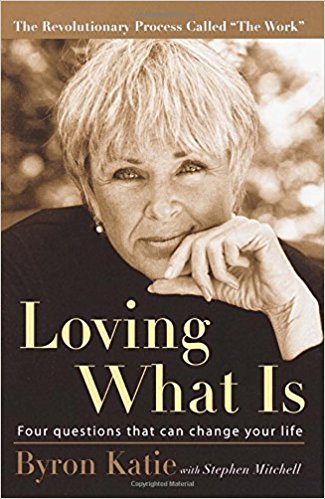|
I recently found myself sitting by a river in Idaho with no agenda or technology - for a whole day! So I read Loving What Is: Four Questions That Can Change Your Life, by Byron Katie.
In it, Katie explains her process, "The Work," through which readers can learn to let go of their negative thought patterns (or "stories") and live a happier life.
It's how she cured her own crippling depression -- but you can use the same strategy to improve your current mood, your relationships, and your life, even if you don't struggle with mental illness. For example, we all deal with difficult people. We all snap unfairly at the people we love most, when the exact same behavior from a stranger would have elicited a polite, "Excuse me, please!" And we all get hurt by words that were not intended to hurt us. Which is why, every time someone says something that hurts you, you should ask yourself two questions, which Katie explains more fully in Loving What Is: 1. Is it true? 2. Are you sure? Because, let's be real: most of the words that hurt us, weren't meant to hurt us. And, to use an analogy from one of my Idaho photos, l can assume the dog is yawning... or freak out, because it's trying to bite my face.
Or, for a more concrete example, here's a story I shared in 5 Things EVERY "Socially Awkward" Person Needs to Know:
I was talking about cars with two dudes the other night. We'd been talking for hours, and we probably looked like ridiculous (not re-diculous) college students, lying on the sidewalk, looking at the stars and eating protein bars. It was kind of epic. So there we were, talking about cars, when I mentioned Tesla's lack of front engines and how that affects the crumple zone. "What's a crumple zone?" Joe asked. I glanced at Sam -- he seemed confused, too. "Are you serious?" I asked -- not out of scorn, but because I was surprised neither of them knew about crumple zones. To be honest, I was having a brief moment of self-doubt -- perhaps it's pronounced crumble zone? Or something? But after a quick beat, I realized the question was sincere, and I answered it. I can easily see why my initial response could have been perceived as rude or scornful (which, of course, is why I addressed the elephant in the room and said, "Whoa -- I didn't mean for it to sound that way. I actually though maybe I had misspoken for a second."). But say I didn't address the elephant, because I thought that would be "awkward." And say you're Joe or Sam, and you've just asked me a question, and my response was, "Are you serious?!" Your feelings could get hurt. You could get defensive. Our budding friendship could come to an abrupt halt. OR! You could ask yourself, Is it true? Are you sure? By doing so, you'd realize there's a decent chance it's not true -- I wasn't being a condescending dick to you. Why would I? We were having such an awesome night! Maybe I was just confused about what you were asking; surprised that something that's common knowledge in my field isn't widely known; or experiencing my own moment of stereotype threat or self-doubt.
Girls love cars, though.
Here's another example, from The Orgasm Gap is Real - But Don't Blame It On The "Patriarchy":
Last week, Feministing published “Here’s What I Would Have Said To You Last Night Had You Not Cum And Then Fallen Asleep.” (It’s the kind of article you click because it has a catchy title, and then you hate yourself for it.) In it, the author suggested that the well-documented “orgasm gap” is not due to gender differences in anatomy or psychology… but due to “the patriarchy.” "Ever heard of a thing called patriarchy? It’s a handy, fancy name feminists (we beautiful, beautiful people) have invented for systems of power (= societies) that favor men. Patriarchy, or a system that privileges men, is like food for our brains and hearts and social experiences... It also structures sex." But here’s the thing: blaming the orgasm gap on “the patriarchy” is relieving yourself of any agency whatsoever over your sex life. For example, consider this: "We fuck until you come, I do not come, you do not ask if I would like to come or if you can help make me come, and then we’re done fucking, because you have decided we are done fucking, and everyone is supposedly happy." In this passage, the author exercises zero agency. She take zero accountability for what happens during a consensual sexual encounter. She blames the patriarchy for the guy not caring about her pleasure. Is it true? Are you sure? You really can't be sure. Maybe the guy is an asshole. But maybe he's just inexperienced. Maybe he doesn't know what you want. Maybe the things he did to you last night worked really well on the last girl he slept with, so he assumed they'd feel good to you, too. Maybe he assumed that you're a big girl who's capable of voicing her preferences, desires, and expectations. So no. You really can't be sure. So why assume the dog is trying to bite your face, when it might actually be yawning?
Because here's the thing:
Your perception is reality. At least somewhat. As I wrote in This Is One of the Most Powerful Psychology Hacks Ever Invented (And It Only Takes a Few Minutes): Functional MRI (fMRI) studies show that our brains process understanding, then belief, then disbelief. In that order. (Probably because disbelief requires the most cognitive effort.) Even if the belief only lasts a moment, it still helps alleviate hurt and anxiety. It still helps resolve some of the uncertainty you've been feeling.
Imagining the world or outcome we want to see will affect how we feel about and respond to it. This practice is known as cognitive reframing.
This is one reason I wrote Telling People Words Only Hurt if You Let Them Isn't Mean. It's Helpful and True. Too many people today think that "words are violence." They most certainly are not. Especially unintended slights and so-called "microaggressions." If you want the words to hurt, they will. If you want to see a better, more empowering (and, honestly, probably more accurate) world... Then go right ahead. *** Want to know more? Check out Quick! Before You Publicly Shame Strangers Who Annoy You on Social Media, TRY THIS! And don't forget to check out Loving What Is: Four Questions That Can Change Your Life, by Byron Katie.
2 Comments
Great article!
Reply
Juliet
7/9/2024 04:18:17 am
This spell caster is powerful………!!,
Reply
Leave a Reply. |
About the Author

Eva is a content specialist with a passion for play, travel... and a little bit of girl power. Read more >
Want to support The Happy Talent? CLICK HERE!
Or Find me on Patreon!
What's Popular on The Happy Talent:
Trending in Dating and Relationships:
What's Popular in Science: Playfulness and Leisure Skills:
Popular in Psychology and Social Skills:
Categories
All
|






























 RSS Feed
RSS Feed